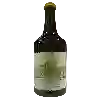
Winery Veuve ParrotCotes Du Jura Savagnin
This wine generally goes well with
Details and technical informations about Winery Veuve Parrot's Cotes Du Jura Savagnin.
Discover the grape variety: Mondeuse noire
Cultivated for a very long time in Savoie, it is not the black form of mondeuse blanche and Mondeuse grise is a natural mutation of mondeuse noire. According to Thierry Lacombe (I.N.R.A./Montpellier), the latter is the result of a natural intraspecific crossing between the black tressot and the white mondeuse. Mondeuse grise and Mondeuse noire are both registered in the official catalogue of wine grape varieties, list A1.
Informations about the Winery Veuve Parrot
The Winery Veuve Parrot is one of of the world's greatest estates. It offers 5 wines for sale in the of Côtes du Jura to come and discover on site or to buy online.
The wine region of Côtes du Jura
Côtes du Jura is a regional appellation in the Jura wine region of eastern France. Introduced in 1937, it is arguably the largest appellation in the region in terms of geographical extent. In terms of quantity, it is the second largest after Arbois">Arbois. While the vast majority of Jura wines are produced in the Northern half of the region between Etoile and Arbois, the Côtes du Jura catchment area extends some distance to the South.
The wine region of Jura
The Jura is a small wine region in eastern France that is responsible for some very special and traditional wine styles. It is close to the Swiss Jura, but quite distinct from it. Wedged between Burgundy to the west and Switzerland to the east, the region is characterized by a landscape of Wooded hills and the winding topography of the Jura Mountains. The Jura vineyards cover just over 1,850 hectares, forming a narrow strip of land almost 80 km Long from North to South.
The word of the wine: Yellow wine
White wines from the Jura region aged in oak barrels without topping up for at least 6 years. A veil of yeast forms on the surface of the wine, which undergoes slow oxidation, giving it a particular taste reminiscent of nuts.













